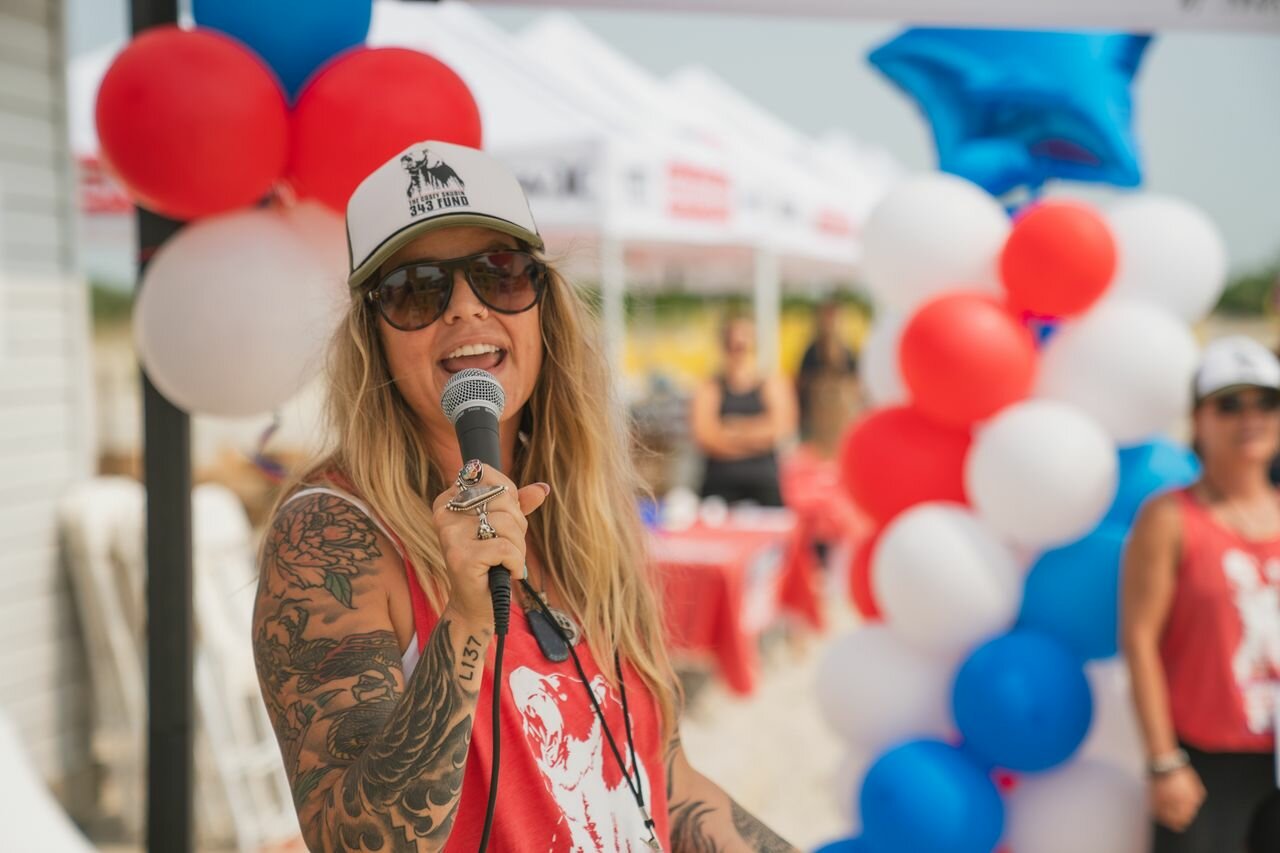First responder support fund launched in memory of Long Beach native
In the aftermath of tragedy, Angela Skudin found herself not only grappling with enormous loss, but also recognizing a significant gap in support for those who endure traumatic incidents like hers. That prompted the creation of the Casey Skudin 343 Fund.
Angela’s husband, Long Beach native Casey Skudin, a decorated New York City firefighter and a member of the renowned Long Beach Skudin surfing family, died on June 17, 2022, at 3:43 p.m., in an accident in a windstorm in North Carolina.
Skudin was driving with Angela and their two sons on Casey’s 46th birthday when a tree limb fell on their car at the Biltmore Estate in Asheville. Angela was unharmed, but Casey was killed, and their youngest son, C.J., sustained injuries and was hospitalized.
“I had learned at the scene of my husband’s death,” Angela said. “The first responders that showed up, they’re the first ones on the scene, and they have to see more traumatic sights than anyone, including myself, and they all took it home.”
Skudin, who joined the FDNY after the Sept. 11 attacks, worked at Ladder 137 in Rockaway Beach, and had received a number of awards for his rescue efforts, including during Hurricane Sandy in 2012.
Not long after he died, Angela established the Casey Skudin 343 Fund, dedicated to aiding first responders in accessing holistic and alternative treatments for trauma and mental health difficulties arising from work their work at fires, accidents and other emergencies.
“It affected every single one of them on a different level, because they were a first responder,” Angela said. “And then having gone through it as a widow, there was just this need for spousal support that just didn’t exist . . . certainly not on a first responder’s salary. My husband was just a helper. He was a hero. He helped everyone, and in his honor, and in his spirit, the Casey Skudin 343 Fund was born.”
Through a grant program, first responders can apply for financial assistance to access alternative healing methods that may not be covered by traditional health insurance plans. They range from infrared saunas to acupuncture to psychedelic-assisted treatments like ketamine therapy, and they can help address the complex trauma and unique challenges faced by first responders for whom traditional treatments aren’t effective.
The fund is run entirely by volunteers, and every donation goes directly to first responders and their families.
Angela had contracted Lyme disease, which prompted her and Casey to explore unconventional healing methods when traditional treatments failed her.
“I went through a battle with Lyme disease before he departed, and it was from 2018 until just right before he died to heal from that, and nothing that I needed was covered by his health policy,” she recalled. “I ran out of prescriptions, I ended up bedridden, covered in sores, misdiagnosed, and then finally properly diagnosed and on the road to recovery. But a big part of my healing came from alternative healing modalities — from infrared saunas, it came from acupuncture, it came from the hyperbaric oxygen chamber.”
Angela’s recovery, marked by her restored health and spirit since 2022, highlights the transformative potential of unconventional approaches.
As the 343 Fund continues its efforts to support healing first responders, the second annual Casey Skudin Memorial Volleyball Tournament is scheduled for June 21, at 1300 Lido Boulevard, across from the entrance to the Loop Parkway. The event serves not only as a fundraiser, but also as a reminder of the resilience and spirit of service that Skudin embodied.
Registration will begin at 8:30 a.m., the opening ceremony will take place at 9:45, and tournament play will commence at 10. The registration fee of $75 per player will serve as a charitable donation, and include an event shirt. Last year’s inaugural event attracted more than 500 participants.
Beyond financial aid, the organization provides comprehensive support to grant recipients, including pre- and post-treatment coaching and access to other healing methods recommended by coaches or practitioners. The goal is to empower first responders to embark on holistic journeys of recovery, free from the stigma that often surrounds mental health issues in their line of work.
In the past year alone, the organization has awarded $170,000 in grants, helping 40 first responders access treatment services.
“There was ignorance in this industry for an incredibly long time,” Angela said, “and the facts are there’s growing suicide epidemics. We’re having opioid epidemics, we’re having alcoholism at disturbingly high rates. We’re having PTSD and treatment-resistant depression. It overruns society with these things. Scientifically, these new modalities are what is the new medicine. And it’s time for the rest of society to catch up and for people to be informed.”

 80.0°,
Partly Cloudy
80.0°,
Partly Cloudy 




